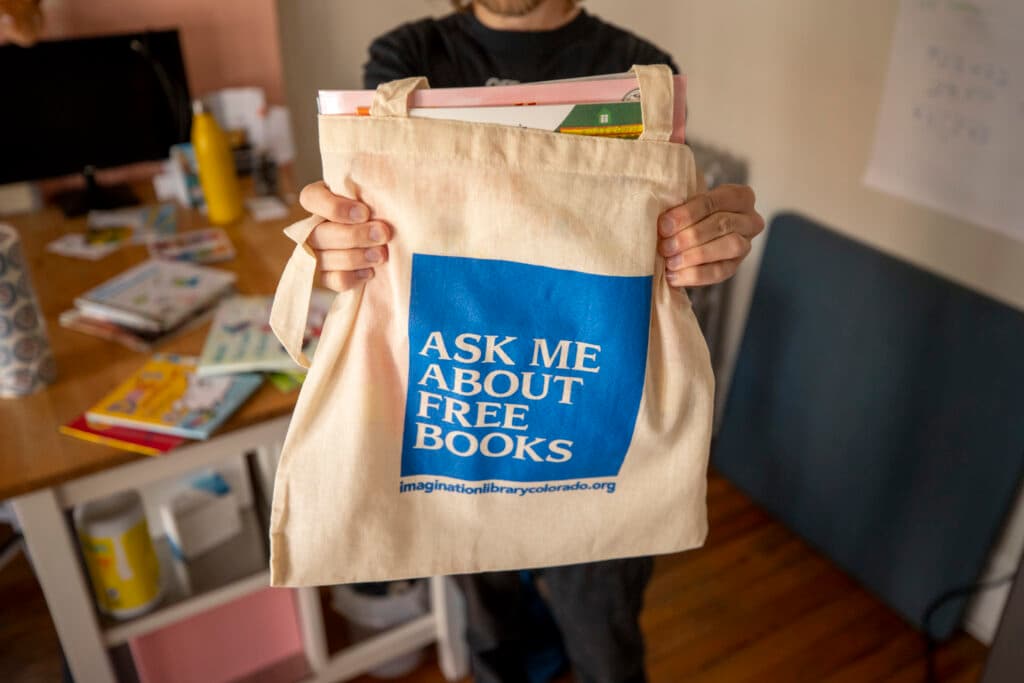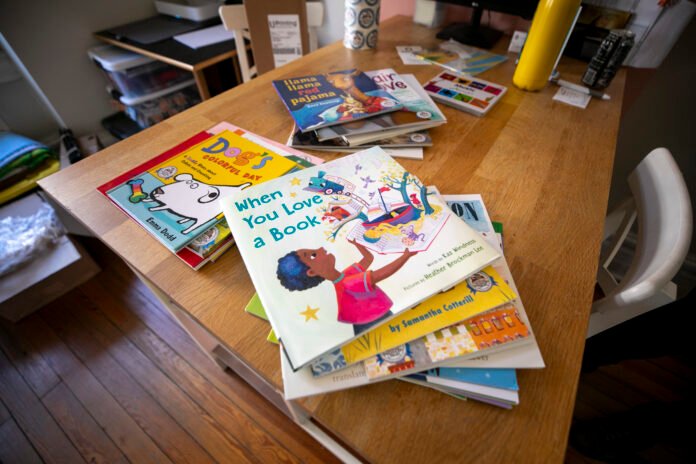Denver’s chapter of Imagination Library, Dolly Parton’s book distribution nonprofit, aims to provide at least 60 percent of Denver’s youngest kids with a book in their mailbox every month.
That mission, however, came to a standstill in May when the chapter had to pause its book deliveries, citing increased book costs, enrollment growth and a loss in funding.
Imagination Library Denver (ILD) launched in 2015 with a mission to increase early childhood literacy, address education inequities and supply families with their own “60-volume library” at no cost. The national Imagination Library organization negotiates the cost of the books and shipping, while the local community raises the funds to pay for them.
In Colorado, the state covers half the books’ cost, but it is up to each chapter to find the rest. That’s where the first challenges arose for Denver.
Early this year, “the cost of books went from $2.20 to $2.60 a piece,” said Anthony Hodes, interim director for Imagination Library Denver.
“In Denver County, that’s like 8,300 families, so on a monthly basis our … bill was increased significantly,” Hodes said.
That 40 percent increase for each book adds up to almost $3,000 a month.
More demand, less funding
These rises were coupled with an increase of 22 percent in enrollment and a significant loss in funding. Laura Douglas, the director of program services for Imagination Library Colorado, said three major family foundations pulled their funding from ILD for what amounted to a $55,000 loss.
Foundations “are focusing their money now on supporting the infrastructure for early childhood education providers,” Hodes said. “These were funds that our yearly projections were built on. When we heard that they weren’t going to be funding us anymore, then we realized that we were in a position where we were kind of going into a deficit.”
Among those that pulled funding is the Buell Foundation. Their last donation to Imagination Library Denver was $21,000 at the end of 2022. John Farnam, the director of responsive grant making for Buell, said funding was redirected to programs that could better guarantee the books are being read and used to foster engagement and understanding through reading.
“The way that it was viewed … was that Imagination Library was book distribution,” Farnam said. “The reading may or may not have happened based on the parents and their comfort with the books that the kids are receiving.”

Now, Imagination Library Denver has launched a fundraiser with a goal of $65,000 to continue delivering books to Denver families at no cost.
The fundraiser has already collected almost $22,000, a number that gives Hodes hope for Imagination Library Denver to restart deliveries in September.
“I think when people get requests for donations in the mail, they think $5 isn’t that big,” Hodes said. “So what we’re trying to do is say if you give $5, that’s two books, right there, on our side. That’s two books and that $5 will be matched then by $5 from the state. That’s $10, that’s four books.”
Mesa County’s program is frozen, too.
Other Imagination Libraries in Colorado are struggling for funding too.
On the Western Slope, the Mesa County Imagination Library will end completely on July 1, only a few years after the local chapter of the United Way touted its expansion with a big celebration, a cardboard cutout of Dolly Parton in attendance.
Ceasing the program “just came down to funding and us justifying our donor dollars,” said Faith Rodriguez, United Way Mesa County executive director.
While the books are free for children, the cost to this local group was $50,000 a year. Compare that with the $200,000 a year United Way Mesa County spends funding dozens of other nonprofits.
Because the book program is national and had no opportunity for branding from local businesses, it was hard to fundraise around it, Rodriguez explained. She also found that of the 5,000 books sent to Mesa County children every month, about 1,000 were undeliverable, likely because the family had moved.
“We’re just really being conservative right now with the way that federal cuts are coming down the pipeline,” Rodriguez said.
Mesa County is launching a new program instead.
United Way Mesa County will launch its own book program July 1. Instead of mailing a book to every young child whose family signs them up, used books will be available for free in a fleet of new book boxes.
Rodriguez has guided her organization to partner with the local school district and libraries to create storytimes and book giveaways. The nonprofit is also reaching out to doctor offices and food banks — basically anywhere that serves the county’s children — to try to make more books available to kids.
Rodriguez said that this new program can’t recreate Parton’s, but she hopes they can make something that fits well with the county, which includes many remote areas not served by traditional libraries.

The organization is “definitely still brainstorming, but we just wanted to have something to roll out without just cutting the program, because we do really care about getting books in the hands of children,” Rodriguez said.
She hopes the new program will serve the same purpose as Parton’s, but actually go further, and “also get books in the hands of all youth, not just children ages zero to 5.”
So far, local reaction to the change has been muted and relegated mostly to online parenting groups, where some moms have expressed their disappointment in the program ending.
Imagination Library says it has an impact.
To address concerns about Imagination Library’s impact in Colorado, the organization sent a parent satisfaction survey in November 2024. The survey asked parents how the program had changed the family’s reading habits, their access to books and their children’s reading readiness for kindergarten.
The survey found:
- 64 percent of parents are reading more often with their kids.
- 31 percent said ILD was the primary source of books.
- 95 percent said the books prepare their kids for kindergarten.
“It’s like building relationship-cultivating family rituals, and then also I think it unlocks your imagination, and you can imagine things that never have existed and bring them into existence through your actions,” Hodes said. “I think it’s a way for us to show every kid in Denver we care, because we do.”
Additionally, Imagination Library Colorado (ILCO) partnered with the University of Denver’s Colorado Evaluation & Action Lab to look at the effects of participation in the program on kindergartener literacy skills. The study found that participation in the Imagination Library program increased kindergarteners’ scores on a standardized measure of literacy skills. It also “decreased the likelihood that a child would score ‘well below benchmark.’”
Gov. Jared Polis, who has celebrated Parton’s program, said in a statement that the Imagination Library is “such an important way for young children and families to access books that can open their mind and help inspire learning at a young age.”
“Colorado is proud of the footprint Imagination Library has in our state and we hope to see the program re-established in Mesa County. Every child deserves the opportunity to have books around them, and data shows it improves outcomes later in life,” he said.






